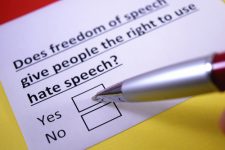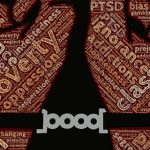Tough New Laws Against Hate Speech

The NSW government is proposing to introduce new laws designed to crack down on hate speech and racial vilification that are intended to incite violence.
Under the proposed new laws, those who incite or threaten violence against others on the grounds of race, religion, sexual orientation or HIV status will face a maximum sentence of three years in prison and/or a fine of $11,000.
The proposed laws will apply to anything available to the public, whether transmitted electronically or digitally, in print, or delivered personally. They will cover communications posted on the internet, including on social media sites.
Current racial vilification laws
In 1989, section 20C was brought into the Anti-Discrimination Act 1977 (NSW) which made our state the first jurisdiction in Australia to make it unlawful for a person, by a public act, to incite hatred towards, serious contempt for, or severe ridicule of a person or group on the grounds of race.
The section makes it clear that it is not unlawful to undertake “a public act… reasonably and in good faith, for academic, artistic, scientific or for other purposes in the public interest.”
The offence carries a maximum penalty of 6 months imprisonment and/or a fine of $10,000 for an individual, or a $100,000 fine for a company.
However, prosecuting the offence is extremely difficult – as it requires written consent from the state’s Attorney General (AG) and, as the state’s current AG Mark Speakman points out, the language of the section and those associated with it are convoluted and imprecise.
For those reasons, there have been no prosecutions under the section since its enactment nearly thirty years ago.
Rather, police have relied upon state offences such as offensive language and conduct, affray and riot to prosecute acts of inciting violence, or the Commonwealth offence of ‘incitement’ under section 11.4 of the Criminal Code Act 1995.
The proposed new laws would come under the Crimes Act 1900 (NSW).
A long time coming
The proposal comes three years after then NSW Attorney-General Gabrielle Upton admitted section 20D of the Anti-Discrimination Act was “broken” and that new laws were required to ensure those who used hate speech to incite violence were prosecuted.
Ms Upton’s comments were triggered by the DPP’s decision not to criminally prosecute Ismail al-Wahwah, the leader of the fringe Islamic movement Hizb ut-Tahrir, after he called for a “jihad against the Jews”. That decision was made on the basis that a conviction was unlikely under current laws.
It should also be borne in mind that a parliamentary inquiry into the state’s racial vilification laws criticised the procedural impediments as far back as 2013. The parliamentary committee recommended 15 changes to the law, none of which were acted upon by the government.
Greens MLC David Shoebridge was part of that committee. He said in 2015:
“This is a Government waiting two years to respond to a unanimous parliamentary inquiry that recommended some pretty sensible and obvious reforms… These laws need to be improved so when we find bigots in our society causing racial vilification they can actually be brought to court and prosecuted.”
Community lobbying
An alliance of 31 ethnic community groups and leaders, known as the ‘Keep NSW Safe Coalition’, has been lobbying the state government to change the laws for years.
Vic Alhadeff, spokesman for the Keep NSW Safe campaign and chief executive of the NSW Jewish Board of Deputies, has repeatedly criticised the government for failing to act on promises for reform.
“The only people in NSW who don’t want to make the promotion and advocacy of violence on the basis of race illegal appear to be in government,” Mr Alhadeff sremarked. “The government can talk about social cohesion but when the time came for real and meaningful action, it has fallen short
Mr Alhadeff has welcomed the proposed new laws, saying they send a clear message that using hate speech to incite violence will not be tolerated.
Hate speech is not free speech
Mr Speakman said the government would ensure the new laws strike a balance between public safety and freedom of speech.
“People who incite violence are a threat to community safety,” Mr Speakman stated. “We’re not saying people can’t have opinions or express their views, but if they cross the line into threatening and inciting violence they will not go unpunished.”
He added that there have always been limits on free speech, and that inciting or threatening violence based on a person’s characteristics crosses the line.







